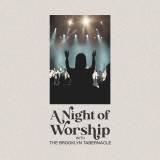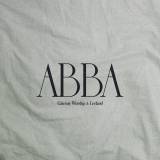Small Church, Big Worship

#1: Every song is a blob of sound.
Why did I choose this one to be number 1? Your sound tech paid me—he’s tired of trying to create music out of mush.
Why did I choose this one to be number 1? Your sound tech paid me—he’s tired of trying to create music out of mush.
(OK, he didn’t, but had he known…)
I chose this one first because it gives us chance to talk about some fundamentals of playing as a band. Plus, many of the other sins are closely related to this one.
There’s several reasons why every song is a blog of sound, but the biggest reason is because we all hang out in the murky, mushy, muddy middle.
The piano dominates the sonic spectrum. That’s why it makes such an incredible solo instrument: it can cover pretty much any part.
The bass is nearly at the bottom of the keyboard’s range (a five-string bass in standard tuning is one note above the lowest not on the keyboard). If you move up the notes of neck, the bass can creep above middle C. But most players tend to stay in the darker shade of green.
Let’s ask a couple questions of the piano/keyboard players:
Where does your left hand love to play?
And where does the bass mostly hang out?
And whose job is it specifically to hold down the low end?
Where does your left hand love to play?
And where does the bass mostly hang out?
And whose job is it specifically to hold down the low end?
Did you hear that?
That was the sound of 10,000 bass players whooping it up in a happy dance.
And keyboarders, don’t think that I’m being “judgy” or critical. I play keys sometimes, too. So I’m pointing a finger at my own heavy left hand.
With 6 strings and 22 frets, the guitar has a pretty decent sonic spread. But here’s the problem. Where do most guitarists want to hang out?
Yep, the open position at frets 1 – 3. That’s pretty much the darker orange area on the graphic. And where do piano players love to play?
See where we’re going here?
The other major instrument in a worship band is a voice. And usually several. Here they are compared to the piano:
Most of your singers will fall between a Mezzo Soprano and a Bass. Look at that...more stuff in the middle.
And now let's put them altogether and add the drum frequencies:
Looking at the frequency range, we have an incredible potential to create a giant blog of mushy, mid-ranged music. Add to that the muddy mess of competing bass tones, and we have a bona fide blob of sound.
The key to overcoming this first mistake is being aware of your place on the sonic spectrum.
If you’re a guitarist or pianist playing an instrumental solo, you can have your entire range. But as soon you start adding other singers and other instruments, it’s time to share and play nice.
This doesn’t mean we never play in the same range as other instruments. But we need to be conscious of creating too much noise in one register.
The point here is to arrange ourselves out of the blob.
And what’s the root word of arrange? “Range.”
We all need to find our niche on the sonic spectrum in each song. Sometimes the piano gets to dominate the mid range while the guitar lays out or goes up higher. Other times, the roles are reversed. (Which is usually the case – because us guitarists are notorious for not being able to play beyond the 4th fret.)
By spreading ourselves over a wider spectrum, the sound tech will actually have something to mix.
We needed to cover this first deadly sin on its own, because several of the other “11 Sins” are related to this. In the next section, we’ll cover several deadly sins that are focused on arranging.
Major transgressions don’t begin as major transgressions.
Think David’s fling with Bathsheba. It started with him putzing around on the roof when he shoulda been with his boys at war.
I don’t want to make light of David’s experiences in 2 Sam 11 & 12. But it’s a vivid picture of how the smaller stuff opens cracks and fissures for the bigger stuff.
If you missed the first section, our #1 mistake is creating a blob of sound.
#2 – Failing to Create Space
Do you have people on your team who play every note of every chord of every measure of every section of every song? Every Sunday.
Do you have people on your team who play every note of every chord of every measure of every section of every song? Every Sunday.
The “demon” behind this goes by the name Overplay. He’s done quite well at infiltrating most worship teams.
Overplaying isn’t a skill thing. It’s a maturity thing.
And this maturity doesn’t have anything to do with age. I’ve know plenty of musicians who have been playing 30 years, but still haven’t figured out what a rest is. The only way to make them stop is to end the music set or make them take a Sunday off.
The amount a musician plays is inversely proportionate to their maturity. More mature = less playing. It’s a mix of emotional maturity and musical maturity.
#3 – Not playing as a team. This is also known as the “Six People Playing the Same Song on the Same Stage in the Same Key and Nearly the Same Time” sin.
As a moniker, it’s a little cumbersome. But pretty descriptive of lots of teams you and I have played on, eh?
This is one of those mistakes that have many contributing factors. But two of the biggest factors are 1) failing to listen to each other and 2) a lousy sense of time.
Occasionally, we’ll start our morning sound check by playing a song sans monitors so the engineer get the house mix dialed in without the mud of the monitors. It’s pretty brutal, but it forces us to really listen to the drummer. We rely on him as the unifying force. (What a novel idea—drums holding a band together. Hmm…)
Unfortunately, the monitors get turned on and everyone just starts listening to him/herself.
Sigh…
In the next part, we’ll take a look at three more sins that contribute to the blob of sound. Until then, let me know what you’re thinking:
How have you experienced the “demon” named “Overplay” on your team. What have you done to “rid your house” of him?
What are some other ways you see these two mistakes “manifesting” themselves in your team? How have you been dealing with them?
I don’t want this to be a one-side conversation, so let me hear from you:How have you helped your band to arrange themselves?
Small Church, Big Worship
 Reviewed by Admin
on
2:40:00 PM
Rating:
Reviewed by Admin
on
2:40:00 PM
Rating:
 Reviewed by Admin
on
2:40:00 PM
Rating:
Reviewed by Admin
on
2:40:00 PM
Rating:
















Post a Comment